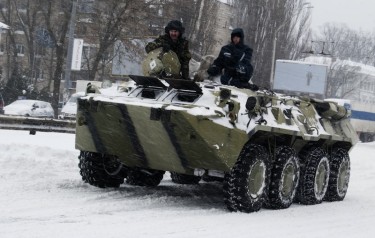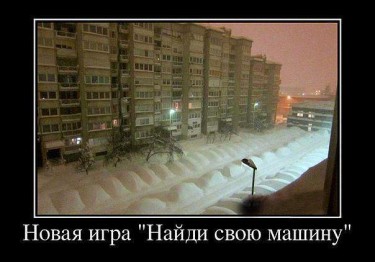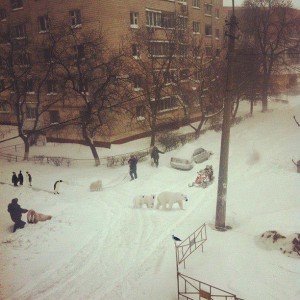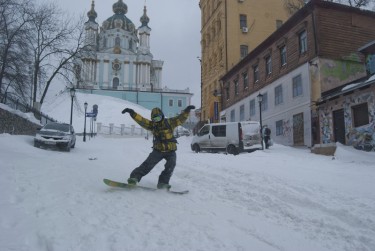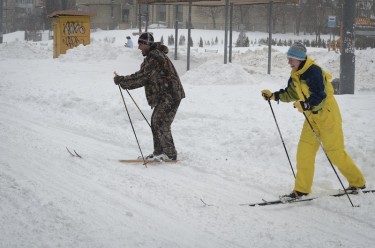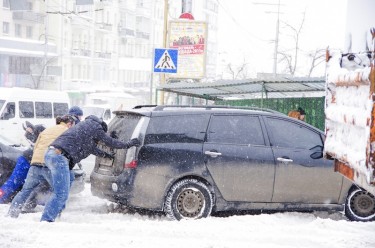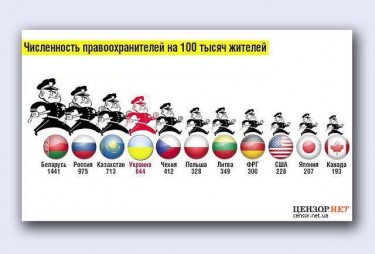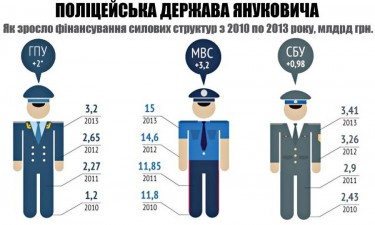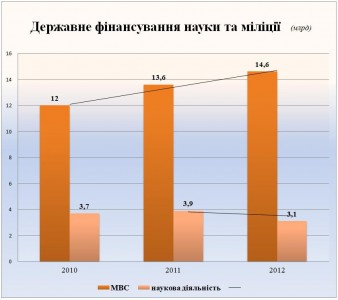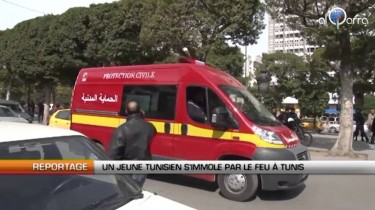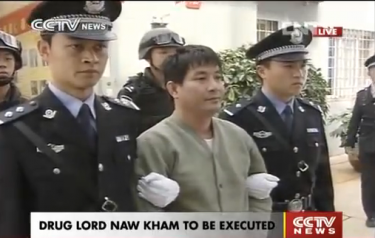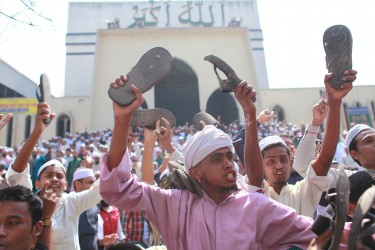On Wednesday, March 13, journalist Olena Danko wrote a short post [uk] on her Facebook page about her supermarket encounter with an old woman who had just enough money to buy a single potato. It was a sad story typical for Ukraine, with nothing in it that could surprise anyone who has lived in the country even for a short period of time. Danko could hardly expect it to have any impact – she just needed to vent out her heartbreak and frustration with the current state of affairs in Ukraine. Yet, many netizens found this story of extreme poverty powerful enough to share it, and, within hours, it went viral.
Two days later, a very incomplete list of reposts looked like this:
- Danko's original Facebook post [uk] has been shared nearly 4,000 times;
- Mykola Kokhanivsky's screenshot of Danko's post has been shared by more than 2,500 Facebook users;
- There's been over 3,600 shares of the screenshot on the Improvement Witnesses’ Church (Церковь Свидетелей Покращення; ru, uk; 17,420 ‘likes'), a Facebook group set up to mock the current regime's so-called “improvements” (a term which has already turned into a meme [ru]);
- The Brutal Men Club, a Ukrainian VKontakte community with over 671,000 followers, has collected nearly 8,800 ‘likes’ on its post featuring the screenshot of Danko's story;
- The FC Karpaty Lviv fans’ VKontakte community has 2,400 ‘likes’ on the screenshot post;
- Ukrainska Pravda journalist Serhiy Leshchenko (8,000 followers) tagged PM Mykola Azarov's Facebook page (24,541 ‘likes') in his repost of Danko's story, recommending that the PM read it in his free time; 473 users shared Leshchenko's post, and many went ahead and re-posted Danko's story on Azarov's page;
- Danko's story has been translated into Russian, by an anonymous translator who even took the time to convert the price of potatoes from Ukrainian hryvnias to Russian rubles.
Here is Danko's story, which took place [uk] in the city of Brovary, a suburb of Ukraine's capital Kyiv:
Went out to a store. At the supermarket's vegetable department an old woman was weighing one!!! potato! The poor saleswoman was petrified. So was I. The old woman said she'd paid for the apartment, for utilities, medicines, and was now surviving on what was left. Today she could allow herself only one potato and a quarter of black bread. I was shocked. Quickly, I went and filled up a whole bag with potatoes, bought it and gave it to the old woman at the cash desk. She felt embarrassed, then thanked me profusely and cried. And I was sobbing on my way home. That bag of potatoes cost only 6 hryvnias [$0.74]. What kind of country is this, [damn it], when the chandeliers at [the President's residence in Mezhyhirya] cost millions, the MPs’ watches cost hundreds of thousands dollars, billions are being laundered through [nonexistent road repairs], and the old woman stands there weighing one little potato?????? Where [the hell] are your [improvements]???? [You all deserve to be burned down]!!!
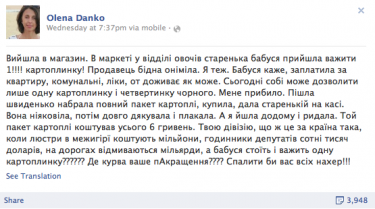
A screenshot of Olena Danko's story, taken roughly two days after it was posted.
And here are some of the reactions from those who chose either to share Danko's story or to just comment on it.
Nataly Levina wrote [ru]:
It's a catastrophe of a country… On the one hand – hungry old people, neglected children, lucky if they haven't been just thrown away, animals savagely tortured or just thrown out to die, parents going crazy from their inability to help their sick children, even though [the money needed may just be $1,000]. And on the other hand – palaces that cost billions, supercars, yachts, helicopters, expensive accessories, watches, bags and weekends, all worth a life of not just one child…
Oleksandr Zorya wrote [uk]:
The thing is, it's not because the country is like that! The reason are people who lack self-respect. Because if they did respect themselves, already [back in the summer of 2012], at the [UEFA Euro 2012], we would have been playing football with the heads of [members of the ruling Party of Regions], and in the finals, with the head of [President Victor Yanukovych], to say the least!!!
Ira Alymova wrote [ru]:
They are spending more than a million of the President's ass daily, and the old woman buys one potato a day because she doesn't have money for more!!!!!! What Europe [are you talking about]!!!!!??????
Larysa Masykova wrote [uk]:
Here it is, an improvement…. Abroad, I have seen more than once how German pensioners are taking walks, sightseeing, taking pictures of historical monuments. They have money for that, courage, and dignity. And how are our old people living what remains of their lives, especially those who are lonely???…
Lora Prykhodko wrote [ru]:
- We now live better, – said the government.
- We are happy for you, – replied the people.
Natalka Fedechko wrote [uk]:
How much would [PM Mykola Azarov]‘s watch cost [if you convert its price into potatoes?] [...]
Sergei Gorbachevsky wrote [ru]:
My mother [worked as a teacher for 50 years], her pension is 1,100 hryvnias [a month; $135].
Alex Siriy added [uk]:
Right, and the Communist [MP Oksana Kaletnik] has a watch that costs $24,000 [ru].
User Yarema Dukh wasn't too impressed [uk] with the reactions to Danko's story:
[...] People, you're not in Ukraine now or what?
You don't see poor pensioners at the market, store or just begging outside their houses every day?
Tomorrow, go and help your neighbor or some random old woman – or go and indeed “burn all the politicians down.”
And then write about it on Facebook and gather your reposts.
Because right now we have this whole country of reposts, reposts, reposts. [...]
Katya Mykhaylova, too, believes [ru] that people should get together offline and help those in need:
Friends and kind people! Let's do a flashmob of assistance this Saturday! Each one of us will first fill a Bag of Help with food and at 10 AM sharp (or at 11 AM, or at noon) will walk out into the street and give the bag, along with wishes of health, to an elderly person who [needs it].
A Bag of Help may cost about 40 hryvnias [$5] and include a ten-day ratio for one elderly person:
- buckwheat
- [dairy products]
- potatoes
- carrots
1 kilo of each, could be 2 kilos of potatoes – they like it when there's much of it.
Additionally, it would be good to add a pumpkin, butter, apples, a chicken.
Everyone! People in every city! In every family! Let's start offering a little help to those who are in need. [...]
If we manage [...] to find 100 attentive and kind people in 10 cities, then the lives of 1,000 old and lonely people would become easier… for nearly half a month. And then again we'll have to gather bags and friends, to make the number of these people grow.
[...]
See you on Saturday… [at the stores], markets, [...] near the old women who are selling things next to subway entrances…
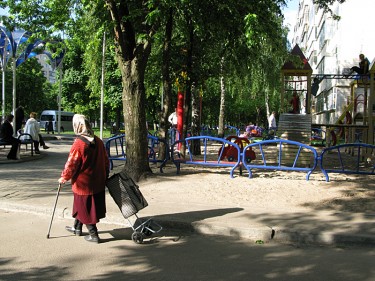
An old woman in the city of Brovary, a suburb of Kyiv. Photo by Veronica Khokhlova, May 29, 2008.
via Global Voices » Feature http://globalvoicesonline.org/2013/03/16/the-old-woman-and-one-potato-a-story-of-poverty-in-ukraine/
